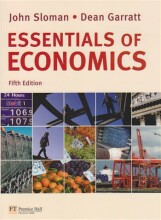Summary: New Economic Powers
- This + 400k other summaries
- A unique study and practice tool
- Never study anything twice again
- Get the grades you hope for
- 100% sure, 100% understanding
Read the summary and the most important questions on New Economic Powers
-
1 Trade Protectionism
-
Why do countries try to protect their trade?
All countries seek to influence trade and respond to their economic, social and political objectives. -
1.1.1 The Role of Stakeholder
-
Why are stakeholder the most apparant to influence trade protectionism?
Those most directly affected such as workers, owners, suppliers, and local politicians whose livelihoods depend on the actions taken are most likely to speak out. -
1.2.1 Fighting Unemployment
-
Which group is most effective at fighting import restrictions?
The unemployed -
Import restrictions to create domestic employment:
- May lead to retaliation by other countries
- Affect large and small economies differently.
- Reduce import handling jobs
- May decrease jobs in another industry
- May decrease export jobs because of lower incomes abroad -
1.2.2 Protecting Infant industries
-
What is the infant industry argument?
A government should shield an emerging industry from foreign competition by guaranteeing it a large share of the domestic market until it can compete on its own. -
1.2.3 Developing an industrial base
-
Countries seek protection to promote industrialization because that type of production:
- can use surplus agricultural workers more easily
- brings in investment funds
- diversifies the economy
- brings faster growth than primary products do -
1.2.3.1 Industrialization argument
-
What are the challenges with industrialization?
- The output may increase if the agricultural workers produced little before
- Demands on social and political services in cities may increase
- Development possibilities in the agricultural sector may be overlooked
- industrial jobs may not be forthcoming -
1.2.3.2 Investment Inflows
-
How does the industrialization influence investment inflows?
If import restrictions keep out foreign-made goods, foreign companies may invest to produce in the restricted area. -
1.2.3.3 Diversification
-
Of what inflkuence is the industrialization on diversification?
Although demand and prices for commodities fluctuate markedly, a shift to production of manufactures creates competitive risk. -
1.2.4.1 Balance of trade adjustments
-
BoT deficits may cause a government to act to reduce imports or encourage exports. Two options are:
- Depreciating its currency
- Relying on fiscal and monetary policy to to bring about lower price increases in general than those other countries
- Higher grades + faster learning
- Never study anything twice
- 100% sure, 100% understanding
Topics related to Summary: New Economic Powers
-
Economic rationales for governmental trade intervention and outcome uncertainties - Economic Relationship with other countries - Affecting Exporters' Price
-
Trade Protectionism - Government's Noneconomic rationales and outcome for trade intervention
-
Trade Protectionism - Major Instruments of Trade Control
-
Globalisation and International Trade
-
Foreign Direct Investment - Theories of Foreign Direct Investment
-
Foreign Direct Investment - Management Issues and Foreign Direct Investment
-
Foreign Direct Investment - Why governments intervene in FDI - Balance of Payments
-
Why governments intervene in FDI - Reasons for intervention by the host country - Control balance of payments
-
Why governments intervene in FDI - Reasons for intervention by the host country - Obtain resources and benefits
-
Foreign Direct Investment - Why governments intervene in FDI - Reasons for intervention by the home country
-
Foreign Direct Investment - Government Policy Instruments and FDI - Host Countries: Promotion
-
Foreign Direct Investment - Government Policy Instruments and FDI - Host Countries: Restrictions
-
Multinational Strategy - Strategic Orientations
































